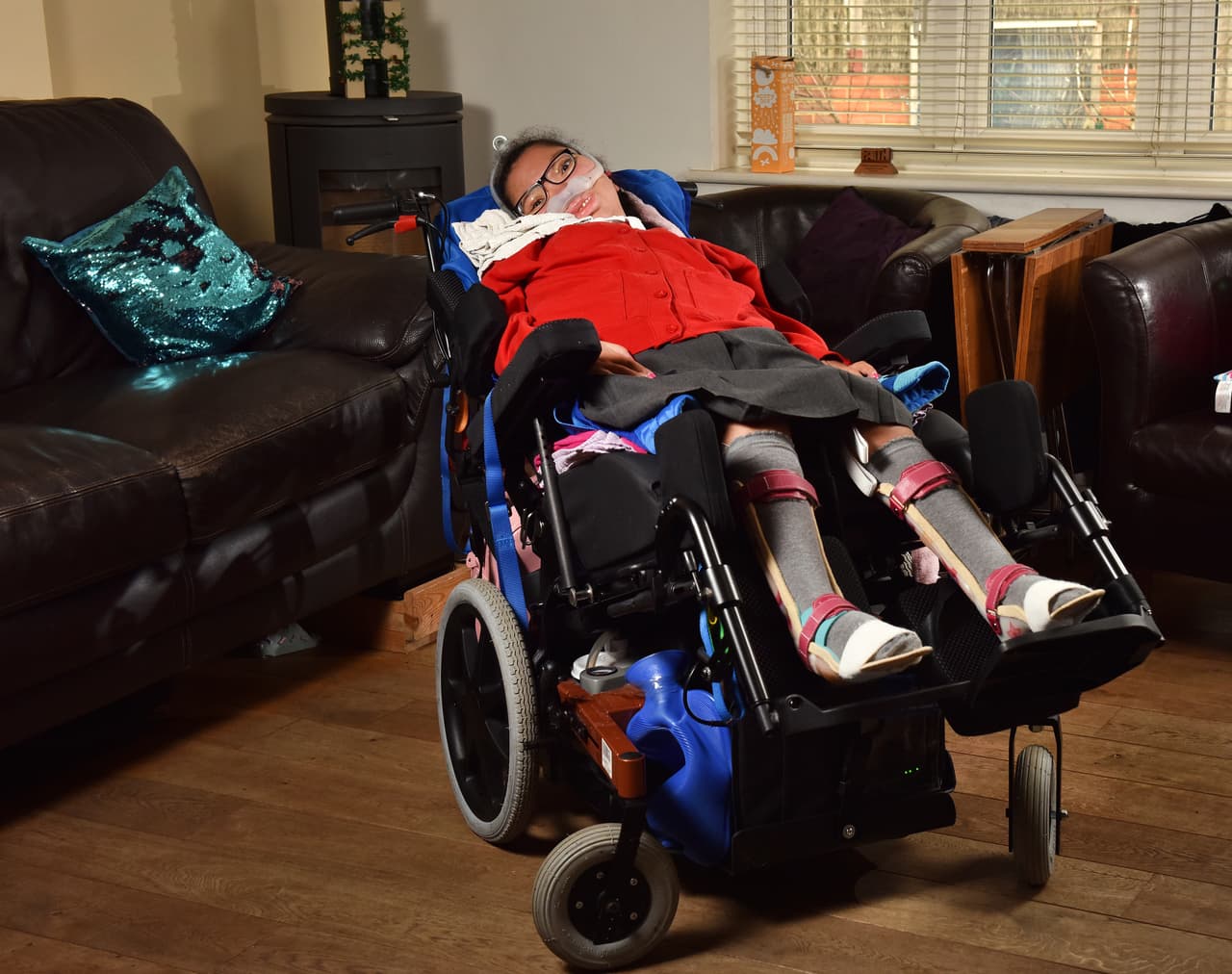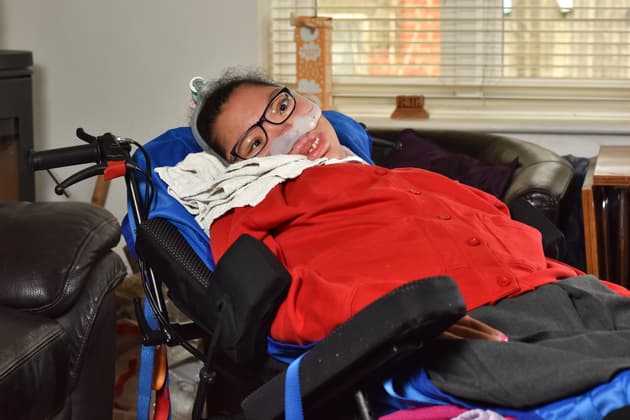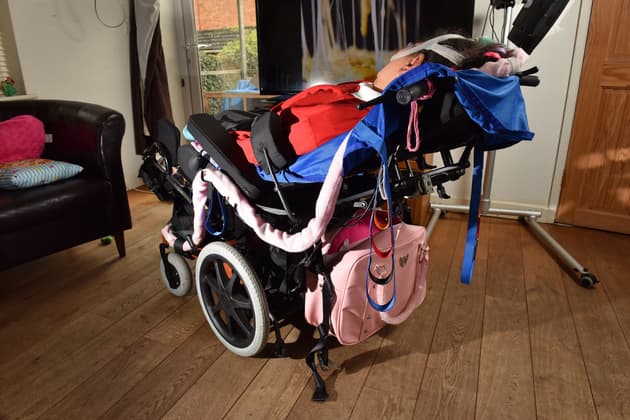
Wheelchair users face "horrific" delays from major NHS provider
This story was commissioned as part of the Bureau's Local Reporting Fund - a grant that supports the reporting of untold stories across the UK.
Cariad Howat is 15, and has spinal muscular atrophy type 1. She has beaten the odds - she is now the oldest child in the UK with her condition. Her condition leaves her unable to sit upright unaided, so at times she needs to sit in a reclined position to feel comfortable - but for nearly two years, she was without a suitable wheelchair.
Until recently her family was locked in a battle with the company that provides wheelchairs for the NHS in Southampton, which they say failed to pay adequate attention to Cariad’s needs.
Her wheelchair problems began in June 2017 when part of her chair broke. Cariad was outgrowing this chair and was assessed as needing a new one - but the company, Millbrook Healthcare, simply welded the broken part of the chair back on and returned it, according to her father Jeremy.
When it broke again last March, Millbrook offered a completely unsuitable replacement before leaving Cariad without any chair at all for eight weeks, Jeremy said. She couldn’t go to school or even leave the house.
“I have a legal requirement to send my daughter to school,” Jeremy told the Bureau. “There could be a million reasons why she cannot attend but a wheelchair shouldn’t be one of them.”
 Cariad Howat needs a wheelchair that can recline in order to feel comfortable
Photo by Morten Watkins, Solent News and Photo Agency
Cariad Howat needs a wheelchair that can recline in order to feel comfortable
Photo by Morten Watkins, Solent News and Photo Agency
 Her family says provider Millbrook left her without a suitable chair for nearly two years
Photo by Morten Watkins, Solent News and Photo Agency
Her family says provider Millbrook left her without a suitable chair for nearly two years
Photo by Morten Watkins, Solent News and Photo Agency
By May, Cariad had a new chair but it was still missing half the features that she needed, including being able to recline. A major issue was that during car journeys the wheelchair “would bounce all over the place,” said Jeremy. “It was horrible for her. We had to strap her head down so that it wouldn’t leave the seat when we went over a bump.” It also didn’t fit in lifts, limiting what she could do on outings with her family or her school.
Her father Jeremy felt they hadn’t taken sufficient time to learn about the family’s needs. “We had to use the special bed elevators to go to a hospital appointment because the chair they’d provided wouldn’t fit in the lift. In over 12 months, they didn’t do the things that were specified."
After an almost two year wait, Cariad finally received a brand new chair with all the required features in January of this year.
Millbrook Healthcare
Cariad’s experience is not a one-off. A considerable number of the country’s worst-performing wheelchair services for waiting times are run by Millbrook, research by the Bureau has found.
Using Freedom of Information requests and publicly available data, we gathered information on wheelchair services provided by NHS Clinical Commissioning Groups (CCGs) across England. Some are run by the NHS itself, others are contracted out to private companies.
Fourteen of England’s 30 worst performing wheelchair services for waiting times over the last two years are run by Millbrook, we found (out of 180 CCGs that provided data to the NHS). At three different CCGs, half of all users failed to get their wheelchairs from Millbrook within 18 weeks.
You can see the full data here. Please note that numerous CCGs merged in 2018
Another six of the worst 30 services are run by Virgin Healthcare. The rest of the worst performing services for waiting times - including the top worst in the time period, Warwickshire North - are services run by the NHS itself.
The ranking highlights the postcode lottery faced by disabled people - all but one of Virgin’s services are in Surrey, and all of Millbrook’s worst performing services are in southeast England or along the south coast. If you are a patient with Millbrook in Southampton, where 50% of people in the last two years waited more than 18 weeks for a wheelchair, you live less than an hour away from the boundaries of Dorset CCG run by the NHS, which got wheelchairs to nearly all its patients (97%) within that same timeframe.
Millbrook is a major provider across England, running wheelchair services for 28 different CCGs serving more than 115,000 people with spinal injuries or life-changing disabilities on average per quarter. This represents about 15% of all the wheelchair users in the UK.
Kent-based wheelchair user Lucy Hudson, 24, describes her experience with Millbrook as “horrific”.
“Before it was handed over to Millbrook it was fine and I had no trouble at all,” said Lucy, who recently graduated from the University of Canterbury.
She says her problems began when she first had to wait eight months for the joystick controller on her electric powerchair to be fixed, during which it was held together by sellotape and cable ties.
The batteries on her five-year-old chair then began to deplete, with Millbrook taking over a month to provide replacements. Lucy says this left her housebound for weeks.
Other cases reported to the Bureau include a person in Portsmouth and a person in West Hampshire who both had to wait more than two years for equipment.
“Wheelchairs are essential for disabled people to live independently, whether that’s going to work, out to meet friends, or simply to the shops,” said Rob Burley, director of campaigns, care and support at Muscular Dystrophy UK.
“But there are substantial gaps in provision and many disabled people do not have access to the basic equipment they need.
“Far too often, we hear from people who cannot leave their homes due to delays, or are forced to buy expensive wheelchairs themselves.”
Broken promises
An NHS wheelchair charter, drawn up by campaigners in 2015 and adopted by NHS England, promises that access and provision to equipment should be the same for everyone “irrespective of age or postcode”. One of the core values is that users with “complex, long-term conditions need to be able to access the right wheelchair quickly and with appropriate support.”
However this has failed to become a reality. Our data shows huge disparity in the amount of time people have to wait to access NHS-funded wheelchairs, depending on where they live. Only two CCGs in the whole of England supplied all patients with chairs within 18 weeks in 2018. At 70 CCGs more than a fifth of all patients had to wait more than 18 weeks.
As well as the cases mentioned so far, the Bureau is aware of complaints in other areas where Millbrook operate, including Kent and Medway where local wheelchair groups have called for the CCG to strip the company of its contract.
A representative for the Kent Wheelchair Users Group, Professor Mike Oliver, who died in March 2019, described the service as “worse now than it has ever been in the 56 years I have used it.”
Privatised wheelchair services have “compounded problems” for people with disabilities, he said.
On its website, Millbrook states: “We maintain exceptionally high levels of customer satisfaction and with 96% of our customer surveys rating our service as good/excellent.”
Responding to our investigation, a spokesperson for the company said: “Millbrook Healthcare refutes assertions made by the Bureau of Investigative Journalism on the basis that they are not factually correct.” However Millbrook has not provided details of any alleged inaccuracies in this article.
Demand for wheelchair services was significantly greater than what the CCGs were able to pay for, they added. In a number of the examples cited by the Bureau the company “had inherited contracts with significant undeclared waiting lists from previous providers, often with shortfalls in ongoing funding to meet increasing demands upon the service.”
New contracts, same troubles
The contract for Millbrook to run wheelchair services for eight CCGs in Kent and Medway was awarded in April 2017, for £5.2m a year.
At the time the company was already struggling to deal with a backlog of wheelchair assessments in Hampshire, where it had been awarded a contract to provide wheelchair services to five CCGs in 2014.
According to a report by patients’ representative body Healthwatch Hampshire in March 2016, “Millbrook realised very early on there were issues and spoke to West Hampshire CCG. This resulted in a system of triaging all cases… and has meant that the service has had to be reactive instead of proactive.”
The Hampshire report noted that Millbrook had initially based the number of staff required on information provided in the tendering process, but that demand for the service was double initial estimates. However, despite securing extra funding to try to meet the higher demand, after two years of Millbrook running the service the number of people waiting for assessment was still more than 650, from the initial waiting list of 1,000. A similar situation occurred in Kent - soon after taking over the wheelchair contract in April 2017, Millbrook “raised concerns about a larger than expected inherited caseload”, according to the governing body of the South Kent Coast CCG. The company took over a service that already had a substantial number of people - 40% - waiting beyond the 18-week threshold. Under Millbrook, that rose to 50%.
By September 2018, a £2m package of extra funding for Millbrook was agreed by the group of eight CCGs to tackle the backlog of people awaiting wheelchairs.
The CCG governing body noted that Millbrook’s initial evidence on this backlog “was not conclusive and the CCGs were not able at this time to discount the possibility they may have underbid during the procurement.”
Caroline Selkirk, managing director of the four east Kent clinical commissioning groups said that “the original bid by Millbrook Healthcare was sound, based on the information available at that time” - a higher proportion of users required specialist wheelchairs than had been expected during the procurement.
Millbrook has also been able to retain business despite documented struggles to provide an adequate service. In one case in 2018 Millbrook was awarded a series of contract extensions despite the CCG wanting to stop Millbrook being the wheelchair service provider.
The minutes of Portsmouth CCG’s governing body meeting in September 2018 noted that:
“The Committee were informed that due to a range of issues the CCG does not want to continue with the current provider. However, in order to ensure enough time for a full procurement, it has been proposed that a direct award is made to the current provider, with a number of conditions.”
As a result Millbrook was granted a combination of one and two-year extensions at different CCGs across the region. Suzannah Rosenberg, director of quality and commissioning for NHS Portsmouth CCG, told the Bureau: “The contract with Millbrook has been extended for one year to ensure users have a stable service while we look for a model to bring in from April 2020. The process for procuring that new service is already underway.”
Speaking about its various contracts across the country, the Millbrook spokesperson said: “transitioning from one provider to another is often challenging and we are working closely with individual service users and their representatives to address the feedback we have received [...] we are having detailed discussions with commissioners around eligibility criteria specifically, and service improvement more generally.” All wheelchair patients are “triaged and prioritised based on clinical need,” they said.
More than just equipment
Even NHS doctors themselves have had to resort to extra measures to get wheelchairs. Dr Hannah Barham-Brown, who has Ehlers-Danlos Syndrome, had to use a crowdfunding campaign for her own wheelchair so that she could work as a doctor.
She campaigns for wheelchair users rights, and also works with the General Medical Council to make a career in medicine more accessible. She was named by the Shaw Trust as one of the top 100 most influential people living with disability in Britain in 2018.
“Outsourcing services to companies who are unable to fulfil the needs of the patients who rely on them for their very independence undermines everything the NHS stands for,” she told the Bureau. “These companies are being paid, by the taxpayer, for a service that is literally not delivering the goods. In the middle of all of this, disabled people are left unable to leave their homes, unable to access education, their friends or work.”
“We want to be able to work, to contribute to society, and it makes economic sense to provide the wheelchairs we need in order to do so.”
Dr Barham-Brown added: “Wheelchairs are more than simply a piece of equipment; they are a lifeline. A lifeline that saves people from being prisoners in their own homes. If companies are unable to provide this in a timely manner, then these contracts should be taken from them, and returned to the health service.
“Systems which allow these companies to take up contracts and let down patients in such a fundamental way are clearly not fit for purpose, and it is disabled people who are left bearing the brunt of this failure.”
Header image of Cariad Howat by Morten Watkins, Solent News and Photo Agency





